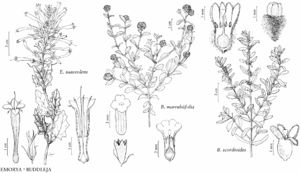Difference between revisions of "Buddleja scordioides"
Nov. Gen. Sp. 2(fol.): 278; 2(qto.): 345; plate 183. 1818.
FNA>Volume Importer |
FNA>Volume Importer |
(No difference)
| |
Revision as of 18:29, 24 September 2019
Shrubs, 3–12 dm. Stems much-branched, tomentose and glandular. Leaves: stipular lines faint; petiole 0 mm; blade grayish, oblong to linear, 1–3 × 0.3–0.8 cm, base cuneate or attenuate, margins coarsely crenate, apex obtuse, surfaces glandular-tomentose. Inflorescences terminal, pseudoverticillate spikes, 2–10 × 0.4–0.7 cm, cymes 3–15 pairs, 6–15-flowered. Pedicels absent; bracteoles absent. Flowers fragrant; calyx thickly tomentose externally, tube 1.5–1.8 mm, lobes 0.2–0.5 mm; corolla lemon yellow or greenish yellow, funnelform, tube 1.5–2 mm, lobes oblong, 1–1.5 × 0.5–0.9 mm; stamens inserted at orifice of corolla tube, included in tube; ovary globular, 0.5–1 mm, glandular-tomentose; stigma clavate, slightly 2-lobed at apex, 0.3–0.5 mm. Fruits capsules, grayish green, subglobular, 1.5–2.5 × 1.5 mm, densely glandular-tomentulose at apex, indehiscent. Seeds ovoid, 0.7–0.8 × 0.5–0.6 mm, wings absent. 2n = 38.
Phenology: Flowering May–Aug; fruiting Sep–Nov.
Habitat: Roadsides, rangeland, thorn scrub.
Elevation: 600–1400 m.
Distribution
Ariz., N.Mex., Tex., Mexico.
Discussion
Buddleja scordioides is weedy and grows on limestone or gypsum soils in the trans-Pecos region of Texas with Flourensia cernua, Larrea tridentata, and Senegalia greggii, and in semixeric areas in central Arizona and southeastern New Mexico. It occurs also in Mexico, throughout the Chihuahuan Desert and as far south as México, at elevations to 2500 m.
Selected References
None.
